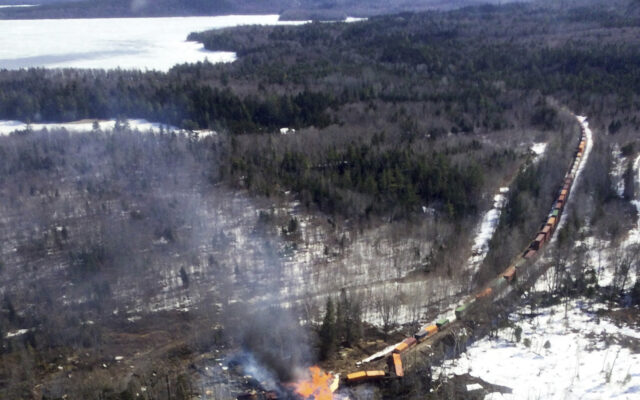
Maine lawmakers should improve hazardous rail cargo transparency
By BDN Editorial Board
A recent train derailment in the Moosehead Lake area reemphasized what was already obvious: Maine needs more transparency when it comes to hazardous materials on railways.
Thankfully, nobody was injured in April when three engines and six cars of a Canadian Pacific Kansas City freight train derailed near Rockwood. And the hazardous materials on the train did not burn in the resulting fire.
But like the February train derailment in East Palestine, Ohio, this incident has once again put focus on the ways that rail safety needs to be improved at both the state and federal levels. A first step in this effort is revisiting a flawed 2015 Maine law that shielded information about railroad cargo from the public via an exemption to the Maine Freedom of Access Act.
The 2015 change was made supposedly in the name of safety and getting rail companies to share more information about cargo with first responders, but it contained no actual requirement that the information be shared. Even the sponsor of that law has since said that some of the information shielded by it should be made public and that total confidentiality was not his intention.
Former Gov. Paul LePage saw that proposal for what it was eight years ago — counter to the public interest and inconsistent with the principle of transparency in government — and vetoed the legislation.
“I am not at all comfortable shielding this information from the Maine citizens that may be placed in harm’s way by these transports. If trains are carrying hazardous materials through our state and this information is shared with our first responders and emergency management entities, then this information needs to be available to our citizens,” LePage wrote in a June 2015 veto message.
He was right. Lawmakers unfortunately overrode his veto at the time, but a group of both Republicans and Democrats in Augusta now support a bill to correct that mistake. LD 1937 would repeal the public records exemption related to hazardous rail cargo, and thus remove this counterintuitive confidentiality. Having less information about hazardous materials on trains clearly does not protect the public.
The bill is led by Democratic House Speaker Rachel Talbot Ross of Portland and is cosponsored by Republican Sens. Rick Bennett of Oxford and Stacey Guerin of Glenburn, and Democratic Reps. Matthew Moonen of Portland, and Tavis Hasenfus of Readfield. Hopefully this politically and geographically broad group of cosponsors is an early indicator of success for the bill, which should become law.
There are numerous steps that should be taken at the state and federal levels to improve rail safety. The Rockwood derailment also raises questions about cleanup responsibility and regulation, for example. But as a clear starting point, Maine lawmakers should pass this bill and require better reporting of hazardous materials on railways. That way, first responders and communities in general can be better prepared should a crash or derailment happen.